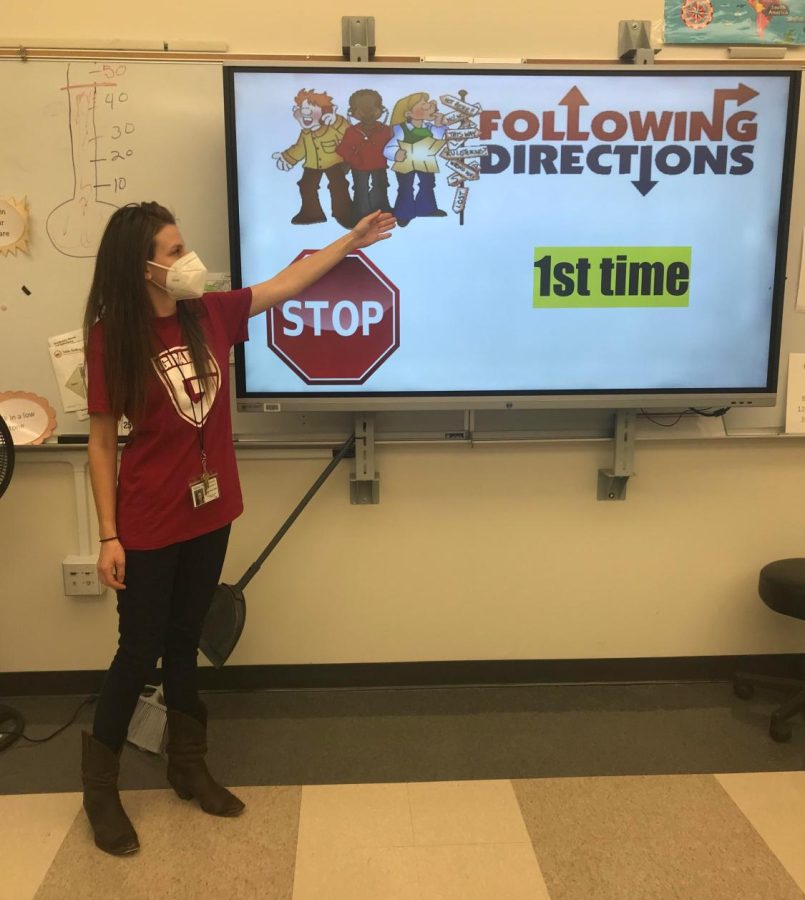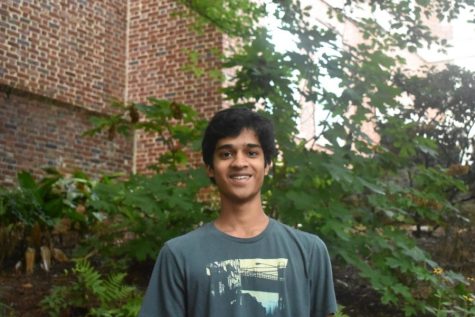Special Education program readjusts to in-person learning
Special Education teacher Mary Gossett appreciates many aspects of in-person school. Gossett has been able to resume normal classroom activities and make connections with her students.
March 9, 2022
While virtual learning was a challenge for all, it was especially tough for the special education students at Midtown, as online school lacked the educational and social resources offered in-person.
“We were heavily impacted by Covid-19 and the school-wide transition to virtual learning,” said Emmaundia Ford, Atlanta Public Schools’ executive director of special education. “We quickly had to come up with a plan for how to provide services that were supported virtually; so, we lost a lot of that face-to-face learning and interaction which is important for all students, especially those in the special education program.”
Though online school proved difficult, the Midtown Special Education Department took steps to make the most of the experience. Teachers and paraprofessionals developed new ways to keep students engaged and transfer their Individual Education Plans (IEPs) to an online setting.
“As online learning was starting, we held a lot of discussions with students and parents about how to best accommodate their learning needs, as well as minimize struggles,” Special Education Lead Teacher Jessica Chiddister said. “We tried to fix most of the issues before the previous school year, so that we could have the most productive year possible.”
School Board member Michelle Olympiadis, whose son Phaethon Constantinides is in Midtown’s special education program, expanded on the communication teachers had with parents over special education at the start of last year.
“I had discussions with the special education teachers at the beginning of the year, and they were helpful in creating a stable environment for Phaethon,” Olympiadis said.
Olympiadis said virtual learning had some downsides. Her son, Phaethon missed all of the opportunities that came with in-person learning, such as community activities and social interaction.
“He missed a lot of the things they did in in-person classes,” Olympiadis said. “He especially missed seeing his friends, as well as doing some of the things they did outside of the classroom in the community.”
However, according to special education teachers, things have begun to look up with the shift back to in-person classes. The shift has returned most things to normal and made both teaching and learning in the special education program more positive and efficient.
“Things are more preferable this year than they were last year, as the transition from virtual to in-person learning has been seamless — much easier than the transition from in-person to virtual learning,” Special Education teacher Mary Gossett said. “We have been able to resume most of our normal activities, and the students have been overjoyed to be able to return to school.”
Math teacher Vicki Vinson, whose grandson Connor is in the special education program, believes in-person special education classes this year have been more effective and engaging than last year.
“Connor has so much more fun in school this year than last, and I have really gotten to see his improvement in in-person classes from when he was in virtual school,” Vinson said. “He has gotten to do more activities in the community, which has been really helpful for him, as it will help him prepare for the world after school. These are things that are really important for him that he wasn’t able to do last year.”
During in-person school, each student with special needs attends four classes per day, including an elective, receiving instruction in either full classes, smaller groups or a one-on-one setting depending on need and learning style. Students have had to be flexible when adjusting back into in-person classes.
“Overall, I feel that after an extremely tough period of virtual learning, the students are adjusting back into their normal pre-Covid routines quite well,” Chiddister said. “I am proud of how flexible and eager to learn they have been, as it has been an adjustment for everyone and a hectic last couple of years.”
One of the most important aspects of the special education program that was not possible during virtual learning is community learning and preparation for life after Midtown.
“It’s sad to think about, but at some point, these students are going to leave Midtown and continue with their lives, and it is our job to help best prepare them for this life ahead,” Chiddister said. “However, our ability to do this was impacted greatly by the pandemic, as we weren’t able to conduct our community learning sessions where we would go out and do things like grocery shopping in the community. A return to in-person learning has allowed us to resume this learning, as well as further work with parents to discuss their children’s future, which is critical to the students’ development.”
Community-instruction has been especially important for Olympiadis’ son, Phaethon, who is currently 20 years old, and is nearing the end of his schooling at Midtown, which will end at his 21st birthday.
“It’s sad that Phaethon’s time at Grady/Midtown is coming to an end,” Olympiadis said. “We are very excited that he has had the opportunity to return to school for another year during
this incredibly challenging time, and that he has had the opportunity to learn some life skills, which will be essential to his life ahead.”
Though school has returned to in-person learning, there are still obstacles related to Covid-19. However, teachers maintain hope for the future of the program.
“Though we have returned to in-person learning, we still have mask mandates and other Covid-related issues that are preventing us from returning back to normal completely,” Ford said. “We have seen great improvements this year with our transition back to in-person learning, and it will only get better as the Covid-19 restrictions are eased.”







